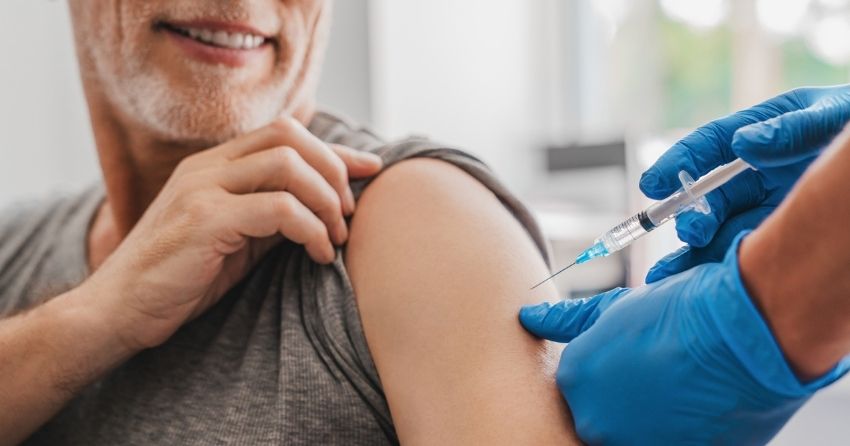A Natural Compound May Boost Vaccine Responses in Older Adults

Vaccines are powerful tools to develop immune memory — the ability of the immune system to respond more rapidly and effectively to a previously encountered pathogen — towards infectious diseases to prevent excess mortality. In older adults, however, vaccines are generally less effective, and why this happens remains largely unknown.
New research shows that autophagy — the vital recycling process within cells — is specifically activated in immune cells by vaccines in healthy human volunteers. The study, published in the journal eLife, demonstrates that the levels of autophagy fall with age in human T cells critical to immune memory, diminishing their functionality.
But when old vaccines are supplemented with the natural compound spermidine, the deterioration of autophagy and subsequent decline in immune function can be rejuvenated in their T cells to levels similarly seen in young donors. “Our study provides a good starting point for a small experimental trial to assess whether spermidine can be used to improve vaccination efficiency in older adults,” said the authors.
Vaccination can save lives at every stage of life
The outbreak of coronavirus disease 2019 (COVID-19) caused a great threat to global public health in 2020 with the majority of deaths occurring in older adults. The development of effective treatments and vaccines against COVID-19 is now more than ever becoming a pressing and urgent challenge to overcome. However, the successful vaccination of the elderly against pathogens is considered one of the big challenges in our society.
With increasing life expectancy, the number of people over 60 years of age is expected to double by 2050, reaching 2.1 billion worldwide. The severity of many infections is higher in the older population compared to younger adults, as particularly notable during the COVID-19 pandemic. Moreover, the success of childhood vaccination is widely recognized but the importance of vaccination of the older population is frequently underestimated.
Immune responses to vaccines are known to be particularly ineffective in the older population, and yet, some vaccines, such as for influenza and SARS-CoV-2, are primarily needed for older adults. The development of drugs that improve vaccination in this expanding population is therefore an urgent socio-economic need.

Is recycling within cells at the crux of vaccine responses?
Immune senescence is characterized by poor induction and recall of immune memory responses upon exposure to new antigens — a foreign substance that induces an immune response in the body, especially the production of antibodies. This can lead to reduced immune responses following immunization of older adults. While most vaccines are less effective at producing immune memory and responses in the older population, little is known about what drives this immune senescence.
Autophagy is thought to be one of the few processes that underlie many facets of cellular aging, including immune senescence. Autophagy recycles damaged cell components that accumulate with age, and its decline could contribute to ‘inflamm-aging’, the age-related increase in inflammatory signals in the blood and tissue. This begs the question: is maintaining autophagy the key to preserving immune memory for more effective immune responses in older humans?
In new research, Alsaleh and colleagues show for the first time that autophagy is indeed highly active in human CD8+ T cells after encountering antigens in donors from two different experimental vaccination trials. But autophagy activity was not the same across all age groups. The researchers saw that autophagy is induced by vaccination in antigen-specific T cells and correlates inversely with donor age — the older the donor, the lower the autophagy. This information is critical in light of their finding that autophagy is required for CD8+ T cell function.
Spermidine administration reinvigorates immune cells from older subjects
The researchers then demonstrated that levels of the autophagy-inducing metabolite spermidine fall in human T cells with age. Interestingly, the researchers previously were able to improve CD8+ T cell autophagy and memory responses from aged mice with spermidine. Also, this natural compound has recently been administered to humans in a small experimental trial with a beneficial effect on cognitive function without adverse effects. But it was unknown whether spermidine at such low doses affects autophagy.
When supplemented with spermidine, the dysfunctional autophagic flux was rejuvenated in CD8+ T cells from old donors. What’s more, the levels of important molecules indicative of CD8+ T cell activity were enhanced as a consequence. Finally, Alsaleh and colleagues identified two factors — eIF5A and TFEB — that spermidine engages to maintain autophagy in these immune cells. “In summary, we have provided evidence for the importance of autophagy in vaccine immunogenicity in older humans and uncovered two novel drug targets that may increase vaccination efficiency in the aging context,” said the authors.

A new intervention for improving immune system health
This work highlights the potential of spermidine as a vaccine adjuvant in older adults. The authors propose that this study provides a good starting point to assess whether spermidine can be used to improve vaccination efficiency in older adults. “We validated a novel anti-immune senescence pathway in humans with druggable targets and biomarkers, which could also be used for other broader anti-aging drug trials,” concluded the authors.
Furthermore, this trial could help to determine if eIF5A, TFEB, and autophagy in immune cells could be used as biomarkers for the anti-aging effect of spermidine and related drugs during vaccination. Based on this information, the vaccination protocol in older adults could, in the future, be adjusted according to whether this pathway is functional in individual vaccines.
References:
Alsaleh G, Panse I, Swadling L, et al. Elife. 2020;9:e57950. Published 2020 Dec 15.





